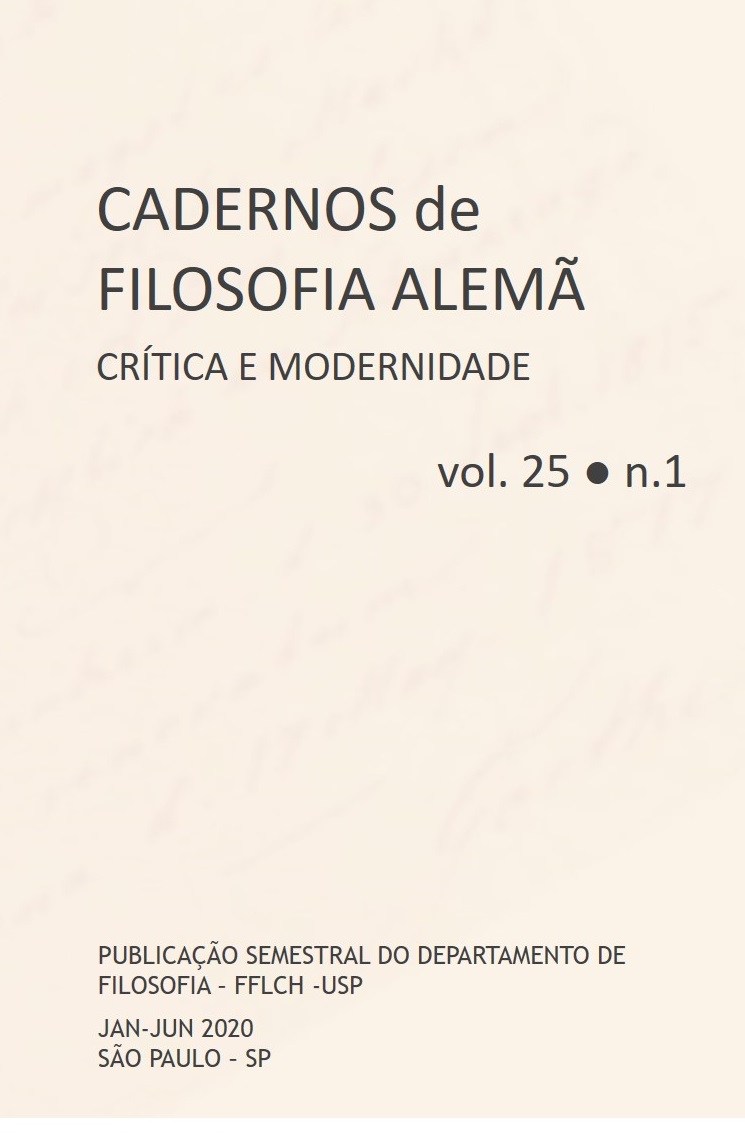Metaphysical dilemmas according to Charles Renouvier
DOI:
https://doi.org/10.11606/issn.2318-9800.v25i1p89-104Keywords:
Charles Renouvier, metaphysical dilemmas, neocriticism, principle of relativityAbstract
This text presents and spars Charles Renouvier’s notions on metaphysical dilemmas in the History of Philosophy. Based on his principle of relativity, this thinker analyzes the most influent philosophies throughout History, pointing out the enclosed contradictions and dilemmas on the theories of realistic metaphysical theories. In this article, we keep track of the outlined dichotomies of Les dilemmes de la métaphysique pure, with the aim to emphasize the philosophical questions that are on the dilemmas rationales and reinforce them as a common thread of Renouvier’s historical analysis.
Downloads
References
Arnal, A. (1907). La philosophie religieuse de Charles Renouvier. Paris: Fischbacher.
Blais, M.-C. (2000). Au principe de la République. Le cas Renouvier. Paris: Gallimard.
Blais, M.-C. (2014). Postuler la liberté? Ce que la philosophie républicaine de Renouvier doit à Jules Lequier. Texto apresentado no Colloque Jules Lequier, realizado pela associação Amis de Jules Lequier, pela République des Savoirs e o Centre International d’Étude de la Philosophie Française Contemporaine, na École Normale Supérieur, Paris, em 30 de setembro de 2014.
Cassirer, E. (1912). Das Problem des Unendlichen und Renouviers “Gesetz der Zahl”. In: Cohen, H. Philosophische Abhandlungen. Berlin: Bruno Cassirer.
Fedi, L. (1998). Le problème de la conaissance dans la philosophie de Charles Renouvier. Paris: L’Harmattan.
Fedi, L. (2002). Philosopher et républicaniser: la Critique philosophique de Renouvier et Pillon, 1872-1889. Romantisme, 115, pp. 65-82.
Hamelin, O. (1899). La philosophie analytique de l’histoire de M. Renouvier. L’Anée Philosophique, 9, pp. 21-48.
Logue, W. (1993). Charles Renouvier, philosopher of liberty. Baton Rouge: Lousiana State UP.
Méry, M. (1963). La critique du christianisme chez Renouvier. 2 vols. 2ª ed. Paris: Ophrys-Gap.
Milhaud, G. (1927). La philosophie de Charles Renouvier. Paris: Vrin.
Renouvier, C. & Pillon, F. (1872-1889). Critique philosophique, politique, scientifique et littéraire. Paris: Au Bureau de la Critique Philosophique.
Renouvier, C., Bellouard, H., Benoit (du Rhône), Charassin, F., Chouippe, A., Erdan, Fauvety, C., et al. (1851). Du gouvernement direct. Organisation communale et centrale de la République. Paris: Librairie Républicaine de la liberté de penser.
Renouvier, C. (1842). Manuel de philosophie moderne. Paris: Paulin.
Renouvier, C. (1844). Manuel de philosophie ancienne. Paris: Paulin.
Renouvier, C. (1848). Manuel républicain de l’homme et du citoyen. Paris: Pagnerre.
Renouvier, C. (1885-1886). Esquisse d’une classification systématique des doctrines philosophiques. 2 vol. Paris: Au Bureau de la Critique Philosophique.
Renouvier, C. (1896). Essais de critique générale. IV. Introduction a la philosophie analytique de l’histoire. Paris: Ernest Leroux.
Renouvier, C. (1899). Du principe de relativité. L’Anée Philosophique, 9, pp. 1-19.
Renouvier, C. (1901a). Les dilemmes de la métaphysique pure. Paris: Alcan, 1927.
Renouvier, C. (1901b). Histoire et solution des problèmes métaphysiques. Paris: Alcan.
Renouvier, C. (1906). Critique de la doctrine de Kant. Paris: Alcan.
Schmaus, W. (2007). Renouvier and the method of hypothesis. Studies in History and Philosophy of Science, 38, pp. 132-148.
Séailles, G. (1905). La philosophie de Charles Renouvier. Introduction a l’étude du néo-criticisme. Paris: Alcan.
Verneaux, R. (1945). Renouvier, disciple et critique de Kant. Paris: Vrin.
Downloads
Published
Issue
Section
License
Information and conceptions on the texts are complete responsibility of the authors.
All the articles submitted before July 5th 2018 and those published after July 2021 are licensed under a CC BY-NC-ND license – except those published between the aforementioned dates, which are under the CC BY-NC-SA license. The permission for the translation of the material published under the license CC BY-NC-ND by third parts can be obtained with the consent of the author.
Open access policies - Diadorim
Rules applied before July 5th 2018:
Presenting a submission to our Editorial Board implies granting priority of publication for “Cadernos de filosofia alemã”, as well as transferring the copyright of texts (once published), which will be reproduced only with the manifest authorization of the editors. Authors keep the right to reuse the texts published in future editions of their work, without paying any fees to "Cadernos”. We will not grant the permission to re-edit or translate the texts for third parts without agreement of the author.


